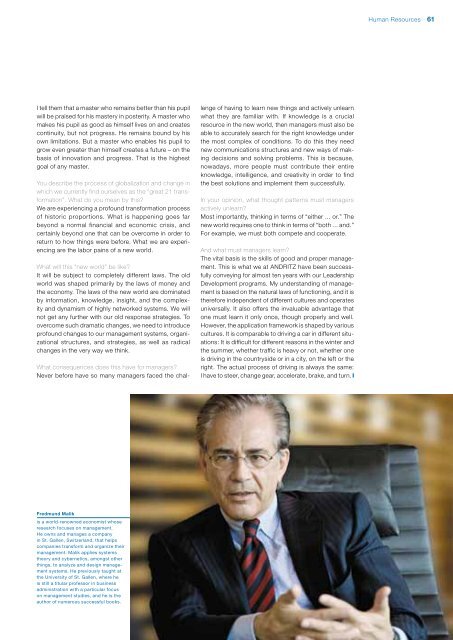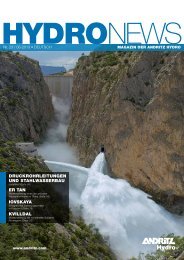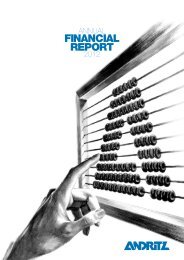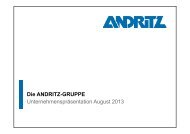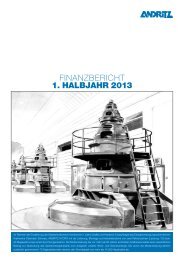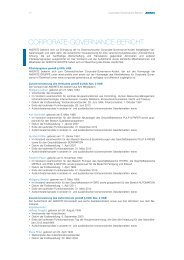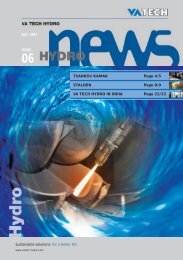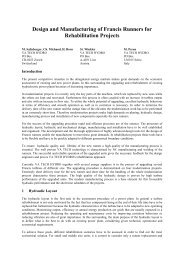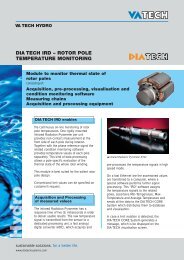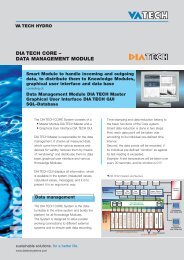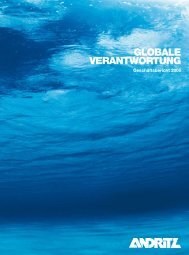ANDRITZ annual report 2012 - ANDRITZ Vertical volute pumps
ANDRITZ annual report 2012 - ANDRITZ Vertical volute pumps
ANDRITZ annual report 2012 - ANDRITZ Vertical volute pumps
Create successful ePaper yourself
Turn your PDF publications into a flip-book with our unique Google optimized e-Paper software.
Human Resources<br />
61<br />
I tell them that a master who remains better than his pupil<br />
will be praised for his mastery in posterity. A master who<br />
makes his pupil as good as himself lives on and creates<br />
continuity, but not progress. He remains bound by his<br />
own limitations. But a master who enables his pupil to<br />
grow even greater than himself creates a future – on the<br />
basis of innovation and progress. That is the highest<br />
goal of any master.<br />
You describe the process of globalization and change in<br />
which we currently find ourselves as the “great 21 transformation”.<br />
What do you mean by this?<br />
We are experiencing a profound transformation process<br />
of historic proportions. What is happening goes far<br />
beyond a normal financial and economic crisis, and<br />
certainly beyond one that can be overcome in order to<br />
return to how things were before. What we are experiencing<br />
are the labor pains of a new world.<br />
What will this “new world” be like?<br />
It will be subject to completely different laws. The old<br />
world was shaped primarily by the laws of money and<br />
the economy. The laws of the new world are dominated<br />
by information, knowledge, insight, and the complexity<br />
and dynamism of highly networked systems. We will<br />
not get any further with our old response strategies. To<br />
overcome such dramatic changes, we need to introduce<br />
profound changes to our management systems, organizational<br />
structures, and strategies, as well as radical<br />
changes in the very way we think.<br />
What consequences does this have for managers?<br />
Never before have so many managers faced the challenge<br />
of having to learn new things and actively unlearn<br />
what they are familiar with. If knowledge is a crucial<br />
resource in the new world, then managers must also be<br />
able to accurately search for the right knowledge under<br />
the most complex of conditions. To do this they need<br />
new communications structures and new ways of making<br />
decisions and solving problems. This is because,<br />
nowadays, more people must contribute their entire<br />
knowledge, intelligence, and creativity in order to find<br />
the best solutions and implement them successfully.<br />
In your opinion, what thought patterns must managers<br />
actively unlearn?<br />
Most importantly, thinking in terms of “either ... or.” The<br />
new world requires one to think in terms of “both ... and.”<br />
For example, we must both compete and cooperate.<br />
And what must managers learn?<br />
The vital basis is the skills of good and proper management.<br />
This is what we at <strong>ANDRITZ</strong> have been successfully<br />
conveying for almost ten years with our Leadership<br />
Development programs. My understanding of management<br />
is based on the natural laws of functioning, and it is<br />
therefore independent of different cultures and operates<br />
universally. It also offers the invaluable advantage that<br />
one must learn it only once, though properly and well.<br />
However, the application framework is shaped by various<br />
cultures. It is comparable to driving a car in different situations:<br />
It is difficult for different reasons in the winter and<br />
the summer, whether traffic is heavy or not, whether one<br />
is driving in the countryside or in a city, on the left or the<br />
right. The actual process of driving is always the same:<br />
I have to steer, change gear, accelerate, brake, and turn.<br />
Fredmund Malik<br />
is a world-renowned economist whose<br />
research focuses on management.<br />
He owns and manages a company<br />
in St. Gallen, Switzerland, that helps<br />
companies transform and organize their<br />
management. Malik applies systems<br />
theory and cybernetics, amongst other<br />
things, to analyze and design management<br />
systems. He previously taught at<br />
the University of St. Gallen, where he<br />
is still a titular professor in business<br />
administration with a particular focus<br />
on management studies, and he is the<br />
author of numerous successful books.


